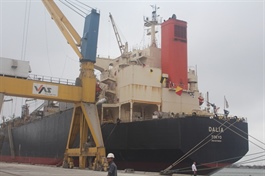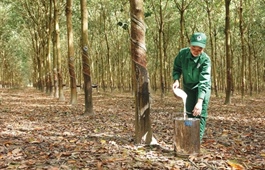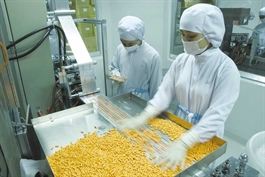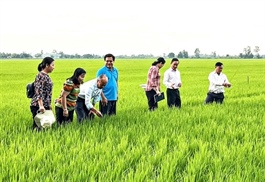Vietnamese businesses told to explore lucrative GCC, South Asia halal markets
Vietnamese businesses told to explore lucrative GCC, South Asia halal markets
With more than two billion consumers, representing nearly 25 per cent of the global population, the halal market is worth trillions of US dollars annually.
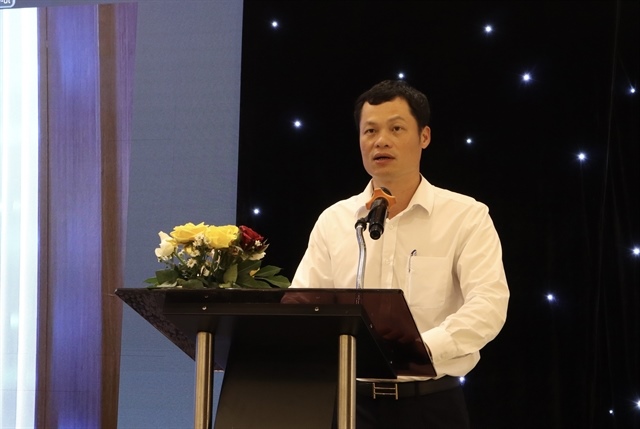
Đỗ Quốc Hưng, deputy director of the Department of Overseas Markets, delivers opening remarks at a seminar titled “Halal Market in the GCC and South Asia – Opportunities and Challenges for Enterprises” in HCM City on July 14.— VNA/VNS Photo |
The Muslim consumer market offers export opportunities for Vietnamese businesses in sectors such as agriculture, food, cosmetics, and textiles if they can meet halal requirements and understand cultural and religious norms, a seminar heard in HCM City on July 14.
Speaking at “The Halal Market in the GCC and South Asia – Opportunities and Challenges for Enterprises” seminar, Đỗ Quốc Hưng, deputy director of the Ministry of Industry and Trade’s Department of Overseas Markets said halal would offer a strategic path for Vietnamese exporters amid the country’s efforts to diversify markets.
With more than two billion consumers, representing nearly 25 per cent of the global population, the halal market is worth trillions of US dollars annually.
In Gulf Cooperation Council member countries, including Saudi Arabia, the UAE, Qatar, Kuwait, Bahrain, and Oman, demand for imports is especially high for foods, beverages, cosmetics, and pharmaceuticals.
The GCC acts as a halal supply chain hub for the Middle East and beyond, while its members’ per capita incomes range from US$40,000 to $80,000.
In 2024 Việt Nam’s trade with the bloc was worth $18 billion, including $7.5 billion in exports. This is expected to grow further once the Việt Nam–UAE Comprehensive Economic Partnership Agreement takes effect, according to Hưng.
Nguyễn Minh Phương, head of the West Asia – Africa division at the Department of Overseas Markets said 90 per cent of food consumed in the GCC was imported due to limited local production.
"Consumers there prefer high-quality, branded products with clear halal certification and demand is not too price-sensitive," she said.
"They also value product origin and packaging and design."
Việt Nam has several product categories well-suited for the GCC, including processed foods (such as seafood, instant noodles and packaged items), agricultural products (like rice, coffee and cashew nut, which are particularly favoured in the UAE and Saudi Arabia) and non-food items like natural cosmetics and eco-friendly textiles, according to Phương.
Some Vietnamese companies such as Vĩnh Hoàn, Cầu Tre and Trung Nguyên have already obtained halal certification and are exporting to markets like Malaysia, Indonesia and the UAE.
These early efforts will pave the way for broader expansion, provided businesses adopt a strategic approach.

Đỗ Quốc Hưng, deputy director of the Department of Overseas Markets, delivers opening remarks at a seminar titled “Halal Market in the GCC and South Asia – Opportunities and Challenges for Enterprises” in HCM City on July 14.— VNA/VNS Photo |
Lê Thị Mai Anh, head of the Southeast Asia, South Asia and regional cooperation division, said South Asia, with its 600 million Muslim consumers, offered vast potential.
Spending on halal food was estimated at $70–100 billion annually, with Pakistan and Bangladesh emerging as key markets.
Consumption patterns were shifting from fresh to processed foods and demand for cosmetics and functional foods was also rising, with a rapidly growing young middle class driving annual consumption growth of 5–7 per cent, she said.
While South Asian halal consumers are price-conscious, they tend to favour natural and organic products, prefer small packaging sizes, and increasingly shop online, according to Anh.
Beyond food and cosmetics, the region also has high demand for light industrial materials such as fibres, textiles and fragrances.
But delegates warned that its potential notwithstanding, the halal market also presented some major challenges.
They included complex and costly certification processes, cultural and taste differences, strong competition, and logistical and trade barriers.
Phương said halal certification would vary by country, with each having its own certification authority. Customs clearance and regulatory procedures could be time-consuming, and slow payment terms would be a problem for exporters.
To succeed in the halal market, particularly in the GCC and South Asia, experts said Vietnamese businesses needed to leverage trade promotion networks, participate in international trade fairs and collaborate with local partners to keep abreast of evolving demands, consumer behaviours and technical requirements.
Nguyễn Thị Ngọc Hằng, marketing director at Halal Certification Agency Vietnam (HCA Vietnam), explained that halal certification was not simply about the absence of pork, but would involve an end-to-end verification process covering ingredients, production lines, packaging, transportation, and storage.
"Certification is issued by product and not company or product line," she said.
"Meeting halal standards not only enables access to Muslim consumers but also opens doors to high-end markets in non-Muslim countries, where transparency and product safety are increasingly valued," she added.
The seminar was organised by the HCM City Centre for International Integration Support and the department of foreign market development.
- 15:35 15/07/2025





